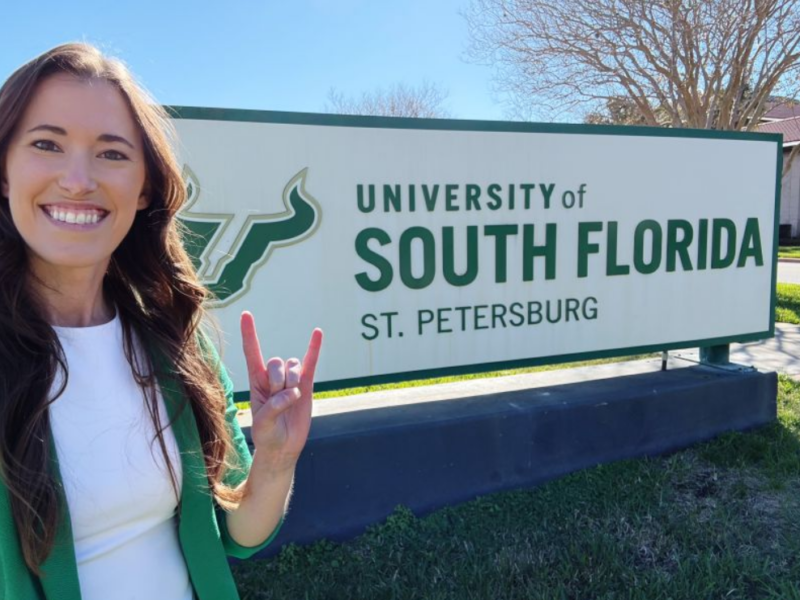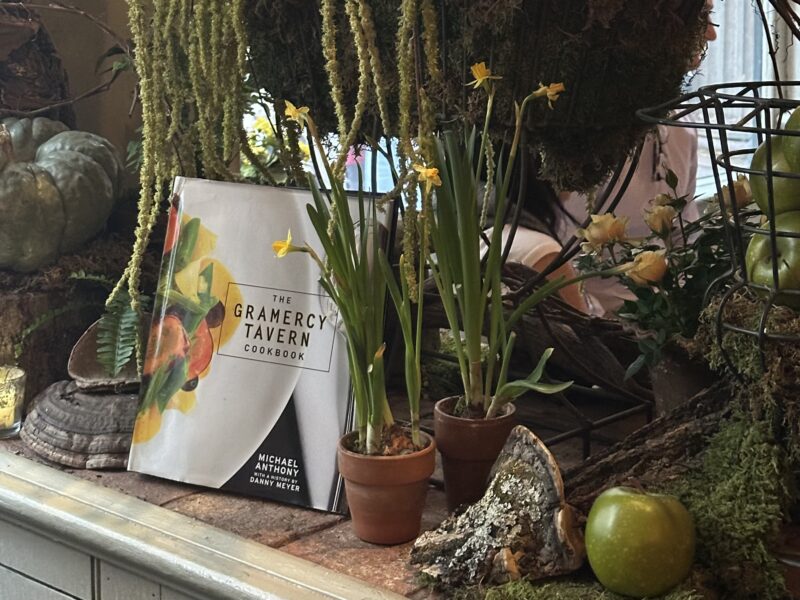 When he wakes up in the morning Wylie gets in a little exercise before breakfast. He puts on his uniform and heads for his office at USF St. Petersburg. Sometimes he walks and sometimes he catches a taxi. He’s lucky to have a seven-hour day, but he spends the whole time worrying about his officemate and isn’t afraid to tell her when she needs a break.
When he wakes up in the morning Wylie gets in a little exercise before breakfast. He puts on his uniform and heads for his office at USF St. Petersburg. Sometimes he walks and sometimes he catches a taxi. He’s lucky to have a seven-hour day, but he spends the whole time worrying about his officemate and isn’t afraid to tell her when she needs a break.
When he can finally get home, if he isn’t dragged to another meeting, Wyle takes time to unwind. He’ll shed his work clothes and take a run through the park or a stroll along the shores of Tampa Bay. There’s something about the smell of rotting fish at low tide that he can’t get enough of.
On his days off Wylie enjoys the tranquility of a trip to the aquarium. He’ll sit there watching the fish that, after taking notice, will begin to crowd around the glass in front of him for better look. After all, it’s not every day that they get to see a guide dog.
Wylie is the guide dog of Deni Elliott, the Eleanor Poynter Chair for Media Ethics & Press Policy and the department chair of Journalism and Media Studies at USF St. Petersburg.
Elliott has a condition called optic neuropathy. Legally blind, she has been slowly losing her vision since her 30s, making a companion like Wylie a requirement. To Elliot, he’s more than a pet; he’s a partner.
“Imagine you have a 1,000-piece jigsaw puzzle all put together. I only have a hundred pieces,” she said. “The rest is all black and blotchy. It’s different from having no vision at all.”
Putting her trust in a dog was easy for Elliott. Some people find it challenging, but Elliot, who has trained dogs her whole life, is confident in the animal’s intelligence and abilities.
“Some of them are not as good as humans,” she said. “And some of the human abilities are not as good as canines.”
For the past 12 years Elliot has depended on guide dogs to get from point A to point B. It is Wylie’s job to worry about obstacles like cyclists or skateboarders on the sidewalk. He goes wherever she goes, even on planes. And they have done a great deal of traveling together. It’s been easy for them, except for one instance when a man insisted that “normal people” shouldn’t have to travel with Elliott and her companion.
“I’m a grown-up professional who has traveled all over the world,” she said. “I’m comfortable and confident and competent. So somebody treating me like a second class citizen or a tall child really because I have a visual disability makes me angry.”
Outside of that incident, however, there hasn’t been much to stand in their way.
“[It’s] a whole lot easier than trusting my cane,” Elliott says. “It’s an interesting kind of partnership. I know this sounds crazy but I trust my guide dog to take care of me much better than any person that’s walking with me.”
#-
Wylie and Elliott have been working together for six years, since Wylie was eight weeks old. But after years of what Elliott describes as mutual frustration between them, Wylie is retiring from guide work.
But he isn’t off to be someone’s pet. Instead, Wylie is moving onto an opportunity to put his skills to best use.
“Most important was Wylie’s future life,” Elliot said. “I knew I had to find something that fit his nature, that made sense and that fit him for a next step. There was no way with the intense work that I could just keep him as a pet and start working with another dog and leave him at home.
“I don’t think any dog likes lying around the house while their people are gone for eight, nine hours a day. And they’re just doing nothing. For a dog as young, intelligent and exposed to the world as Wylie is, it would just drive him crazy.”
In her search for somewhere to turn Wylie over to, Elliot found the Pals Program out of Fort Jackson in Columbia, S.C. In his new career, Wylie will be working with veterans struggling with Post Traumatic Stress Disorder.
“His job will be to help his veteran deal with combat related anxiety,” she said. “He’ll have more of that tactile connection that he really likes. The veteran he’s going to be placed with is someone who needs Wylie to lead him out of a darker place than I’ve ever been.”
Wylie loves being active; a lifestyle Elliott just cannot give him. She says his favorite year was the one when she had a graduate assistant who was a triathlete and would take Wylie on long runs. That is what he will get in his new life, going on 10 mile runs and hanging out in singles bars, which Elliot says will suit him perfectly.
“I call him my goofy frat boy,” she said, laughing. “He’s just real easy going.”
When they get home Elliott wants him to take time for himself. But Wylie wants to be close, to be petted and scratched. Those are the interactions he misses during the day when he’s on duty.
Sitting in Elliott’s office, Wylie will interject himself in a conversation on the hopes someone will scratch his head. When he’s told to lie down, he sulks away, never having gotten that scratch, and plops down on the floor in front of her massive bookshelf—his usual spot.
“He works but not always joyfully,” she said. “I learned not to ask Wylie to do something for me during class because he’ll stand and yawn and stretch and look around and say, ‘Oh you want me to pick that up?’ and he’ll drop it a couple times. It takes 10 minutes and it’s completely disrupted the class and what we were doing.”
#-
The search for Elliott’s new partner was extensive. Her chief concern was finding a place that matched her ideals and satisfied her as an ethicist and a dog lover.
“Part of my intention in finding the right guide dog school was someplace that was intelligent and respectful of its clients but also respectful of its dogs,” she said.
The search led her to Guiding Eyes for the Blind in Yorktown Heights, N.Y. At the beginning of March, Elliott will spend two weeks in New York working with her new partner before returning to St. Petersburg. When they return home they will spend another five days working with an in-home trainer to get Elliott’s new companion all settled in to his or her new role.
The training process is exhaustive for the dogs. Wylie was taught to walk with a harness, which he used to communicate with his partner. Wylie had to learn that it wasn’t just his size and shape he needed to worry about, but someone else’s too. Wylie can understand over 200 words and can be spoken to in complete sentences.
Despite the image many people have of guide dogs, they are not without flaws. Wylie still struggles when objects are held over his head.
“There’s no such thing as a perfect dog, in that there is no such thing as a perfect human,” Elliot said. “We just don’t come that way. People that have dogs as pets see the pet as an extension of them, but don’t take the time to understand the dog in his own right and his own personality and understand what the dog needs. I think that people need to understand that dog partners need to be understood for who they are.”
Wylie has never chewed a shoe but couldn’t avoid those puppy moments.
“When he was young, we were in Montana. He chased a wild turkey and it led him into a beehive. I heard all this yelping and he came running back,” Elliot said. “He never chased another wild turkey.”
Reflecting on their time together and the lasting impact Wylie would have, she begins to tear up.
“He’s taught me to be less arrogant,” she said. “I’ve probably had dogs in the past I thought were smarter than me but he’s the first I’m sure of. He’s taught me to trust him that he sometimes knows better. He’s also helped me learn that for some things it’s OK to trust other people.”
It pains Elliott to make the decision but she says the reason she can make it is because she loves him so much. She is confident Wylie will love his new job. Six months from now, Elliott and Wylie will see each other again. Elliott says he should be comfortable with his new owner by then. But their relationship won’t end there.
“I will be getting updates,” she said. “What happens to him is very important to me.”
Photo by Thomas Boyd


